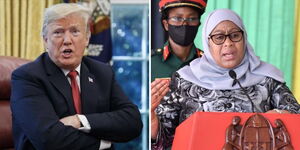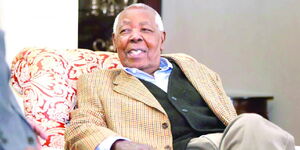President Uhuru Kenyatta, who has been at the helm of the country’s leadership since the year 2013, has been taunted as the Head of State with an aggressive vision for development and has been at the forefront in the fight against corruption, poverty, inequality and uneven distribution of resources.
In his successive speeches during national events, international meetings, and other leadership conversations, Mr Kenyatta has remained steadfast in his commitment to fight the three-toed sloth of our generation: poverty, diseases and illiteracy.
However, his aggressive speeches and seemingly visible commitment to fight inequality, are a house built on quicksand if a recent leak - the Pandora Papers - is anything to go by.
The Pandora Papers, the biggest leak of financial papers in history and containing 12 million files and obtained by the International Consortium for Investigative Journalists (ICIJ), has linked Mr Kenyatta’s family to offshore bank accounts and companies valued at over Ksh3.3 billion.
The Kenyatta’s are arguably among the richest families in Kenya having investment interests in the hospitality sector, the banking industry, and farming among others. They are also some of the biggest landowners in the country with huge chunks of land in various parts of the country.
The Pandora Papers, detail that the Kenyatta’s family led by Mama Ngina Kenyatta, the incumbent President, his sisters and brothers, have amassed wealth offshore and in the tax havens of Panama and the British Virgin Islands.
According to the papers and as detailed by ICIJ, the leak - which was shared with over 600 investigative journalists worldwide - a Panamanian law firm identified as Aleman, Cordero, Galindo & Lee (Alcogal) holds records showing that the Kenyatta family own at least seven companies and foundations in the tax havens.
“The records show that the family owned at least seven such entities, two registered anonymously in Panama and five in the British Virgin Islands,” details ICIJ.
The report further details that one of the entities owned by the Kenyatta’s in the British Virgin Island, owns a home in Central London, United Kingdom.
The British Virgin Islands is one of the most notorious tax havens in the world where billionaire world leaders and businessmen are known to stash billions of dollars.
The Pandora Papers, which are a collection of financial documents from 14 law firms and other service providers based in the United Arab Emirates, the Seychelles, Panama and Singapore, went ahead to reveal that Mr Kenyatta and his mother, Mama Ngina Kenyatta, are listed as the main beneficiaries of Varies Foundation, a trust-like foundation designed to manage and shelter wealth for beneficiaries.
The Pandora Papers named the Kenyatta’s among 35 other world leaders including President Ali Bongo of Gabon and the King of Jordan as among the most influential and significant persons with unimaginable magnitude of wealth stashes offshore.
Uhuru’s War on Inequality
Mr Kenyatta, Kenya’s fourth Head of State, Commander-in-Chief and the ruling Jubilee Party leader, was first catapulted into elective in 1997 when he contested for the Gatundu South Parliamentary seat but lost to Moses Mwihia, an established city architect.
His dream to succeed his father, the country’s founding President, Mzee Jomo Kenyatta, did not end with this defeat. In the year 2002 during the clamour for change in the country, the Head of State, the late Daniel Arap Toroitich Arap Moi, would abandon his strongmen and women, his fiercest defendants and closest allies and settle on the young Kenyatta as his preferred successor.
Mr Kenyatta would go on to become the independent party’s, Kenya African National Union (KANU) flagbearer in an election that would change the country’s political course forever. He, however, lost to Emilio Mwai Kibaki who was the National Rainbow Coalition (NARC) candidate. NARC was a coalition of more than ten opposition political parties including Kibaki’s Democratic Party, Liberal Democratic Party and the National Alliance Party of Kenya (NAPK) among others.
Despite the young Kenyatta losing the presidential election, signifying the end of the 40-year dictatorial rule of the KANU regime, he went ahead to become the Member of Parliament for Gatundu South, a position he held until 2013 when he successfully contested for the presidency.
His presidency was delivered through a win that brought him and his deputy William Samoei Kipchichir Ruto together. The duo - who were then facing charges of crimes against humanity at the International Criminal Court (ICC) at the Hague in Netherlands - brought together The National Alliance (TNA) and the United Republican Party (URP) outfits to garner over 51 percent of the votes cast in the March 2013 elections.
In their 2013 election campaigns, Mr Kenyatta and Mr Ruto, pledged to put an end to the glaring inequalities among Kenyans. The two would go ahead to pledge a revolutionary approach to turnaround the country’s economy in less than five years.
However, since they took over power, the country’s inequality gap has widened further despite Kenya registering an admirable growth in the Human Development Index, going up from 0.519 in 2013 to 0.601 in 2019.
Graft and Inequality
The inequality gap between the haves and the have nots has been made worse by the ever rising cases of public money theft, pilferage and misuse of resources.
On January 18 this year, Mr Kenyatta would be quoted as saying that Kenya loses Ksh2 billion daily to graft. The Head of State, who expressed helplessness at the time, accused high ranking officials in his government of being at the centre of the runaway misappropriation of government resources.
His tenure, which comes to an end after the August 9, 2022 General Election, has seen Kenya lose billions of shillings through scandals such as KEMSA, Afya House, NHIF and the Ruaraka Land one.
Despite Mr Kenyatta’s tough talk on graft and his willingness to slay the beast, there has been no significant conviction. His legacy, including that of the Big Four Agenda, now lays in limbo even as succession politics enter the homestretch.












